最新george orwell_animal farm 动物农场概括资料
《动物农场》故事梗概
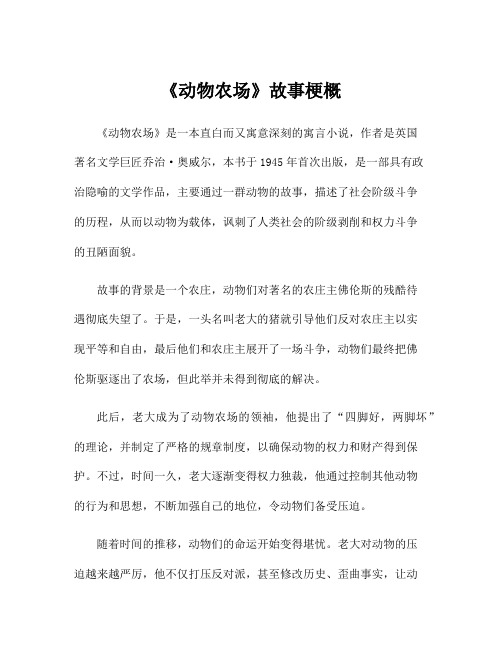
《动物农场》故事梗概《动物农场》是一本直白而又寓意深刻的寓言小说,作者是英国著名文学巨匠乔治·奥威尔,本书于1945年首次出版,是一部具有政治隐喻的文学作品,主要通过一群动物的故事,描述了社会阶级斗争的历程,从而以动物为载体,讽刺了人类社会的阶级剥削和权力斗争的丑陋面貌。
故事的背景是一个农庄,动物们对著名的农庄主佛伦斯的残酷待遇彻底失望了。
于是,一头名叫老大的猪就引导他们反对农庄主以实现平等和自由,最后他们和农庄主展开了一场斗争,动物们最终把佛伦斯驱逐出了农场,但此举并未得到彻底的解决。
此后,老大成为了动物农场的领袖,他提出了“四脚好,两脚坏”的理论,并制定了严格的规章制度,以确保动物的权力和财产得到保护。
不过,时间一久,老大逐渐变得权力独裁,他通过控制其他动物的行为和思想,不断加强自己的地位,令动物们备受压迫。
随着时间的推移,动物们的命运开始变得堪忧。
老大对动物的压迫越来越严厉,他不仅打压反对派,甚至修改历史、歪曲事实,让动物们逐渐忘记了自己的最初目标:平等和自由。
最后,动物们终于认识到,“所有的动物都是平等的,但某些动物比其他的动物更平等”,老大这位独裁领袖变成了比佛伦斯更可怕的野兽。
《动物农场》中的每一个角色都代表着不同的人物和思想,老大代表着斯大林,其他的动物则代表着被压迫的人民,而佛伦斯则代表了资本家阶级。
虽然故事中涉及的人物是一些动物,作者透过他们的行为和思想暗示了人类的种种丑陋和罪恶,借此声讨了当时的社会和政治现实,不禁让人思考人性和社会进步的真谛。
总之,《动物农场》是一部有益且富有哲学含义的文学经典,它鞭挞了独裁统治、人性贪婪等多种人类罪恶,在当今阶级斗争日趋激烈的时代背景下,再次引起人们关于权力、财富和平等的思考。
动物农场情节总结

动物农场情节总结引言《动物农场》是英国作家乔治·奥威尔创作的一部寓言小说,于1945年首次出版。
小说以动物农场为背景,讲述了农场动物们希望摆脱人类统治的斗争过程,旨在批判苏联的共产主义体制。
本文将对《动物农场》中的情节进行总结。
主要情节动物反抗人类统治在动物农场,人类主人对动物们的剥削和压迫一直存在着。
由于主人的草率和暴虐,动物们秘密集会,举行了一次会议。
会上,猪领袖老大对动物们传达了他们希望摆脱人类统治的愿望。
经过一番激励和呼吁,动物们决定推翻人类的统治,并将农场重新命名为动物农场。
動物管理動物推翻人类统治后,动物们开始自行管理农场事务。
由于猪领袖老大的领导能力和智慧,动物农场取得了一系列的成功。
他们重新分配工作任务,让每只动物都能有所贡献。
不过,猪领袖渐渐产生权力欲望,并建立起一个猪的领导阶级。
动物主义的崩溃由于猪领袖的权力欲望和腐败,原本寄予厚望的动物农场逐渐变质。
猪领袖通过策划事件、篡改历史和施行恐怖统治来维持自己的权力。
农场的七项原则也被修改,原本的“所有动物都是平等的”变为“所有动物都是平等的,但猪更平等”。
最终,动物农场的理想主义崩溃,动物们再次被剥削和压迫。
主要角色猪领袖老大猪领袖是动物农场的重要角色,他以智慧和领导能力赢得了动物们的尊敬和信任。
然而,他渐渐受到权力的腐蚀,变得专横和冷酷。
最终,他背离了最初的理想,成为了动物农场内的新统治者。
小老大小老大是猪领袖的得力助手,也是狗群的负责人。
他通过恐吓和暴力手段维护了猪领袖的权力,成为了恐怖主义的象征。
女马巴多女马巴多是充满正义感的马,她为了维护团结和平等而奋斗。
然而,随着动物农场变质,她的抵抗和坚持变得无力。
总结《动物农场》通过对动物农场的建立和崩溃过程的描述,深刻揭示了权力腐败和革命理想的矛盾。
尽管动物们最初希望摆脱人类统治,建立一个平等和公正的社会,但最终他们却被内斗、欺骗和压迫所束缚,梦想破灭。
本书以幽默的寓言方式,警示人们警惕权力的腐化和个体在权力面前的无力。
《动物农场》故事梗概

《动物农场》故事梗概
《动物农场》是美国作家乔治·奥威尔于1945年出版的一本具有
里程碑意义的历史小说,改编自马克思和恩格斯的“共产主义论”。
故事中,一群智慧的猪们居住在一个曾经是人类殖民者所有的农场。
由于猪们自己有自己的计划和抱负,他们通过引导、指导和权衡来取
代人类操控农场和所有物,夺取自由,创造出属于自己的新世界。
此外,猪们还会通过精心设计的法律和制度保障动物农场的未来,并在
一切和谐的基础上发展生活环境,使得许多动物都能够享受到更多的
自由和公正的待遇。
尽管一开始对人类表现出极端的反感,但是他们
后来发现,自由比任何形式的高度控制更加珍贵,而彼此间的相互合
作和尊重比暴力更能维持幸福的生活。
最后,动物农场重新变成了一
个公平、自由、充满希望的地方,人类也不再一味的侵犯他们的权利,各种动物也终于能安居乐业地生活在一起。
《动物农场》故事梗概
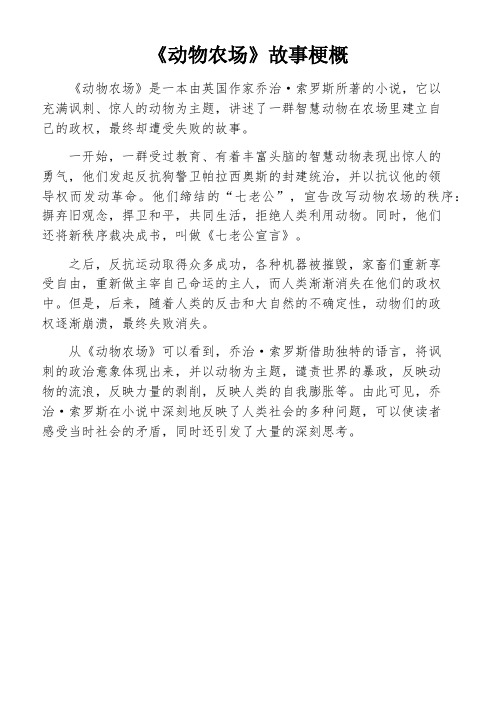
《动物农场》故事梗概
《动物农场》是一本由英国作家乔治·索罗斯所著的小说,它以
充满讽刺、惊人的动物为主题,讲述了一群智慧动物在农场里建立自
己的政权,最终却遭受失败的故事。
一开始,一群受过教育、有着丰富头脑的智慧动物表现出惊人的
勇气,他们发起反抗狗警卫帕拉西奥斯的封建统治,并以抗议他的领
导权而发动革命。
他们缔结的“七老公”,宣告改写动物农场的秩序:摒弃旧观念,捍卫和平,共同生活,拒绝人类利用动物。
同时,他们
还将新秩序裁决成书,叫做《七老公宣言》。
之后,反抗运动取得众多成功,各种机器被摧毁,家畜们重新享
受自由,重新做主宰自己命运的主人,而人类渐渐消失在他们的政权中。
但是,后来,随着人类的反击和大自然的不确定性,动物们的政
权逐渐崩溃,最终失败消失。
从《动物农场》可以看到,乔治·索罗斯借助独特的语言,将讽
刺的政治意象体现出来,并以动物为主题,谴责世界的暴政,反映动
物的流浪,反映力量的剥削,反映人类的自我膨胀等。
由此可见,乔治·索罗斯在小说中深刻地反映了人类社会的多种问题,可以使读者
感受当时社会的矛盾,同时还引发了大量的深刻思考。
《动物农场》故事梗概
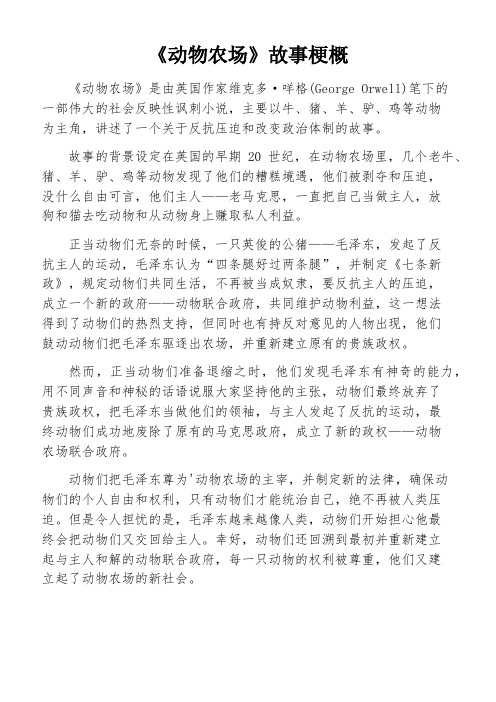
《动物农场》故事梗概
《动物农场》是由英国作家维克多·咩格(George Orwell)笔下的
一部伟大的社会反映性讽刺小说,主要以牛、猪、羊、驴、鸡等动物
为主角,讲述了一个关于反抗压迫和改变政治体制的故事。
故事的背景设定在英国的早期20世纪,在动物农场里,几个老牛、猪、羊、驴、鸡等动物发现了他们的糟糕境遇,他们被剥夺和压迫,
没什么自由可言,他们主人——老马克思,一直把自己当做主人,放
狗和猫去吃动物和从动物身上赚取私人利益。
正当动物们无奈的时候,一只英俊的公猪——毛泽东,发起了反
抗主人的运动,毛泽东认为“四条腿好过两条腿”,并制定《七条新政》,规定动物们共同生活,不再被当成奴隶,要反抗主人的压迫,
成立一个新的政府——动物联合政府,共同维护动物利益,这一想法
得到了动物们的热烈支持,但同时也有持反对意见的人物出现,他们
鼓动动物们把毛泽东驱逐出农场,并重新建立原有的贵族政权。
然而,正当动物们准备退缩之时,他们发现毛泽东有神奇的能力,用不同声音和神秘的话语说服大家坚持他的主张,动物们最终放弃了
贵族政权,把毛泽东当做他们的领袖,与主人发起了反抗的运动,最
终动物们成功地废除了原有的马克思政府,成立了新的政权——动物
农场联合政府。
动物们把毛泽东尊为'动物农场的主宰,并制定新的法律,确保动
物们的个人自由和权利,只有动物们才能统治自己,绝不再被人类压迫。
但是令人担忧的是,毛泽东越来越像人类,动物们开始担心他最
终会把动物们又交回给主人。
幸好,动物们还回溯到最初并重新建立
起与主人和解的动物联合政府,每一只动物的权利被尊重,他们又建
立起了动物农场的新社会。
《动物庄园》内容概括
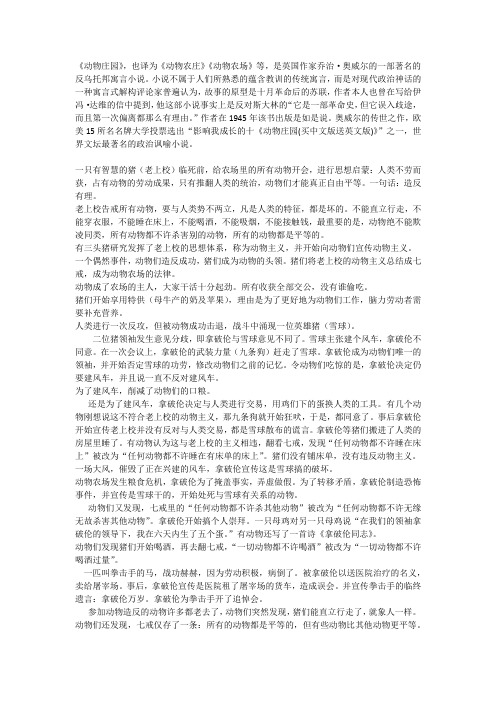
《动物庄园》,也译为《动物农庄》《动物农场》等,是英国作家乔治·奥威尔的一部著名的反乌托邦寓言小说。
小说不属于人们所熟悉的蕴含教训的传统寓言,而是对现代政治神话的一种寓言式解构评论家普遍认为,故事的原型是十月革命后的苏联,作者本人也曾在写给伊冯·达维的信中提到,他这部小说事实上是反对斯大林的“它是一部革命史,但它误入歧途,而且第一次偏离都那么有理由。
”作者在1945年该书出版是如是说。
奥威尔的传世之作,欧美15所名名牌大学投票选出“影响我成长的十《动物庄园(买中文版送英文版)》”之一,世界文坛最著名的政治讽喻小说。
一只有智慧的猪(老上校)临死前,给农场里的所有动物开会,进行思想启蒙:人类不劳而获,占有动物的劳动成果,只有推翻人类的统治,动物们才能真正自由平等。
一句话:造反有理。
老上校告戒所有动物,要与人类势不两立,凡是人类的特征,都是坏的。
不能直立行走,不能穿衣服,不能睡在床上,不能喝酒,不能吸烟,不能接触钱,最重要的是,动物绝不能欺凌同类,所有动物都不许杀害别的动物,所有的动物都是平等的。
有三头猪研究发挥了老上校的思想体系,称为动物主义,并开始向动物们宣传动物主义。
一个偶然事件,动物们造反成功,猪们成为动物的头领。
猪们将老上校的动物主义总结成七戒,成为动物农场的法律。
动物成了农场的主人,大家干活十分起劲。
所有收获全部交公,没有谁偷吃。
猪们开始享用特供(母牛产的奶及苹果),理由是为了更好地为动物们工作,脑力劳动者需要补充营养。
人类进行一次反攻,但被动物成功击退,战斗中涌现一位英雄猪(雪球)。
二位猪领袖发生意见分歧,即拿破伦与雪球意见不同了。
雪球主张建个风车,拿破伦不同意。
在一次会议上,拿破伦的武装力量(九条狗)赶走了雪球。
拿破伦成为动物们唯一的领袖,并开始否定雪球的功劳,修改动物们之前的记忆。
令动物们吃惊的是,拿破伦决定仍要建风车,并且说一直不反对建风车。
为了建风车,削减了动物们的口粮。
《动物农场》故事梗概
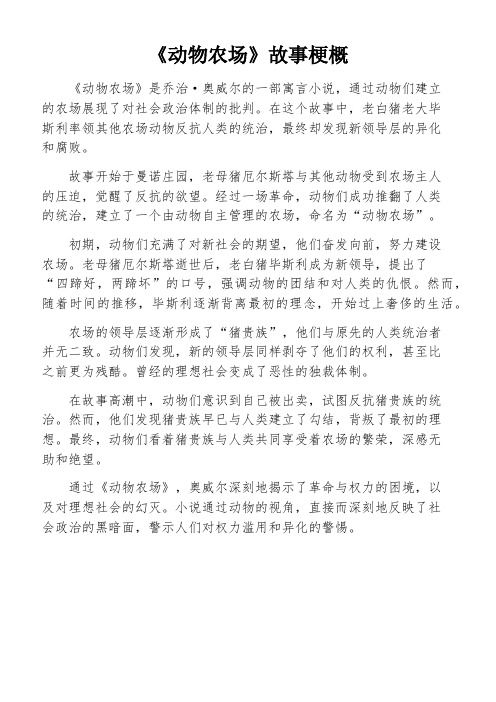
《动物农场》故事梗概
《动物农场》是乔治·奥威尔的一部寓言小说,通过动物们建立
的农场展现了对社会政治体制的批判。
在这个故事中,老白猪老大毕
斯利率领其他农场动物反抗人类的统治,最终却发现新领导层的异化
和腐败。
故事开始于曼诺庄园,老母猪厄尔斯塔与其他动物受到农场主人
的压迫,觉醒了反抗的欲望。
经过一场革命,动物们成功推翻了人类
的统治,建立了一个由动物自主管理的农场,命名为“动物农场”。
初期,动物们充满了对新社会的期望,他们奋发向前,努力建设
农场。
老母猪厄尔斯塔逝世后,老白猪毕斯利成为新领导,提出了
“四蹄好,两蹄坏”的口号,强调动物的团结和对人类的仇恨。
然而,随着时间的推移,毕斯利逐渐背离最初的理念,开始过上奢侈的生活。
农场的领导层逐渐形成了“猪贵族”,他们与原先的人类统治者
并无二致。
动物们发现,新的领导层同样剥夺了他们的权利,甚至比
之前更为残酷。
曾经的理想社会变成了恶性的独裁体制。
在故事高潮中,动物们意识到自己被出卖,试图反抗猪贵族的统治。
然而,他们发现猪贵族早已与人类建立了勾结,背叛了最初的理想。
最终,动物们看着猪贵族与人类共同享受着农场的繁荣,深感无
助和绝望。
通过《动物农场》,奥威尔深刻地揭示了革命与权力的困境,以
及对理想社会的幻灭。
小说通过动物的视角,直接而深刻地反映了社
会政治的黑暗面,警示人们对权力滥用和异化的警惕。
《动物农场》故事梗概
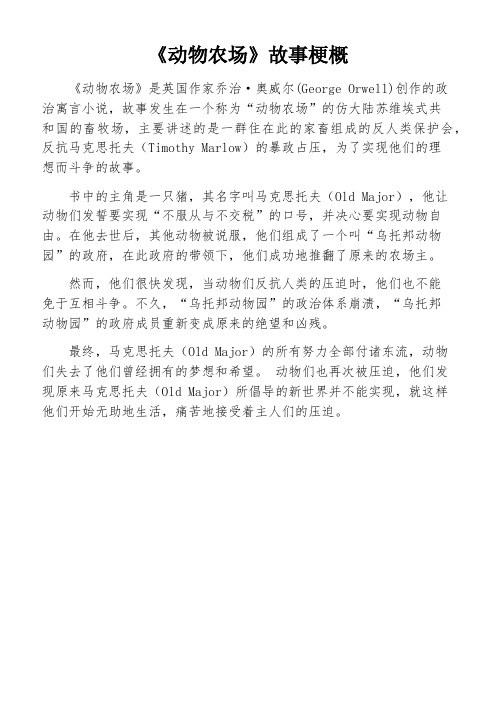
《动物农场》故事梗概
《动物农场》是英国作家乔治·奥威尔(George Orwell)创作的政
治寓言小说,故事发生在一个称为“动物农场”的仿大陆苏维埃式共
和国的畜牧场,主要讲述的是一群住在此的家畜组成的反人类保护会,反抗马克思托夫(Timothy Marlow)的暴政占压,为了实现他们的理
想而斗争的故事。
书中的主角是一只猪,其名字叫马克思托夫(Old Major),他让
动物们发誓要实现“不服从与不交税”的口号,并决心要实现动物自由。
在他去世后,其他动物被说服,他们组成了一个叫“乌托邦动物园”的政府,在此政府的带领下,他们成功地推翻了原来的农场主。
然而,他们很快发现,当动物们反抗人类的压迫时,他们也不能
免于互相斗争。
不久,“乌托邦动物园”的政治体系崩溃,“乌托邦
动物园”的政府成员重新变成原来的绝望和凶残。
最终,马克思托夫(Old Major)的所有努力全部付诸东流,动物
们失去了他们曾经拥有的梦想和希望。
动物们也再次被压迫,他们发
现原来马克思托夫(Old Major)所倡导的新世界并不能实现,就这样
他们开始无助地生活,痛苦地接受着主人们的压迫。
《动物农场》故事梗概
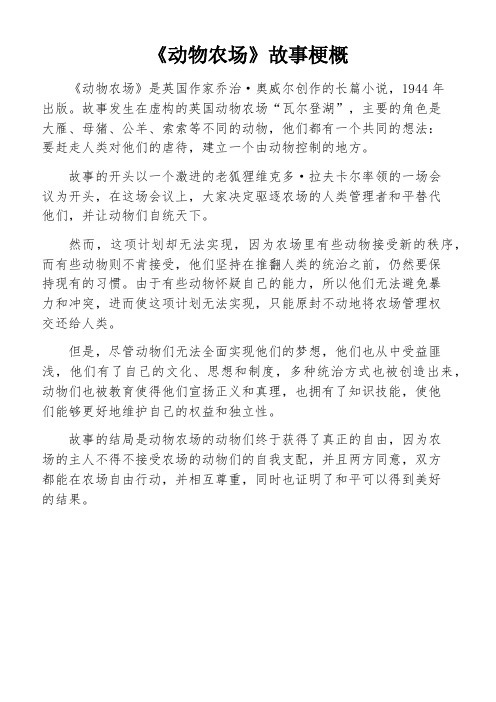
《动物农场》故事梗概
《动物农场》是英国作家乔治·奥威尔创作的长篇小说,1944年
出版。
故事发生在虚构的英国动物农场“瓦尔登湖”,主要的角色是
大雁、母猪、公羊、索索等不同的动物,他们都有一个共同的想法:
要赶走人类对他们的虐待,建立一个由动物控制的地方。
故事的开头以一个激进的老狐狸维克多·拉夫卡尔率领的一场会
议为开头,在这场会议上,大家决定驱逐农场的人类管理者和平替代
他们,并让动物们自统天下。
然而,这项计划却无法实现,因为农场里有些动物接受新的秩序,而有些动物则不肯接受,他们坚持在推翻人类的统治之前,仍然要保
持现有的习惯。
由于有些动物怀疑自己的能力,所以他们无法避免暴
力和冲突,进而使这项计划无法实现,只能原封不动地将农场管理权
交还给人类。
但是,尽管动物们无法全面实现他们的梦想,他们也从中受益匪浅,他们有了自己的文化、思想和制度,多种统治方式也被创造出来,动物们也被教育使得他们宣扬正义和真理,也拥有了知识技能,使他
们能够更好地维护自己的权益和独立性。
故事的结局是动物农场的动物们终于获得了真正的自由,因为农
场的主人不得不接受农场的动物们的自我支配,并且两方同意,双方
都能在农场自由行动,并相互尊重,同时也证明了和平可以得到美好
的结果。
《动物农场》故事梗概
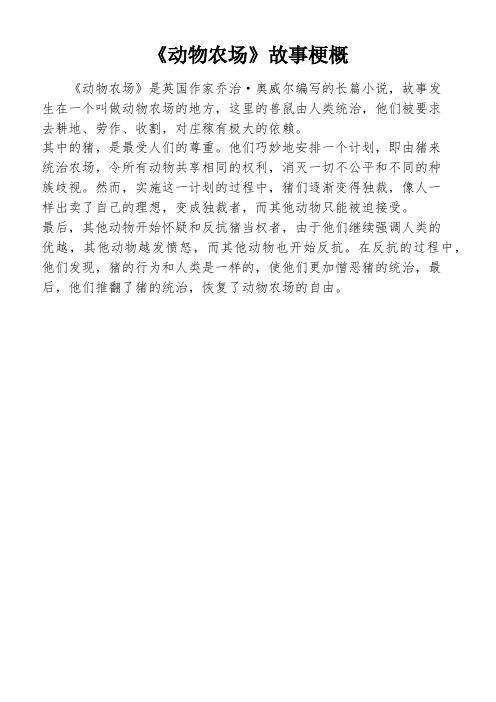
《动物农场》故事梗概
《动物农场》是英国作家乔治·奥威尔编写的长篇小说,故事发
生在一个叫做动物农场的地方,这里的兽鼠由人类统治,他们被要求
去耕地、劳作、收割,对庄稼有极大的依赖。
其中的猪,是最受人们的尊重。
他们巧妙地安排一个计划,即由猪来
统治农场,令所有动物共享相同的权利,消灭一切不公平和不同的种
族歧视。
然而,实施这一计划的过程中,猪们逐渐变得独裁,像人一
样出卖了自己的理想,变成独裁者,而其他动物只能被迫接受。
最后,其他动物开始怀疑和反抗猪当权者,由于他们继续强调人类的
优越,其他动物越发愤怒,而其他动物也开始反抗。
在反抗的过程中,他们发现,猪的行为和人类是一样的,使他们更加憎恶猪的统治,最后,他们推翻了猪的统治,恢复了动物农场的自由。
《动物农场》故事梗概
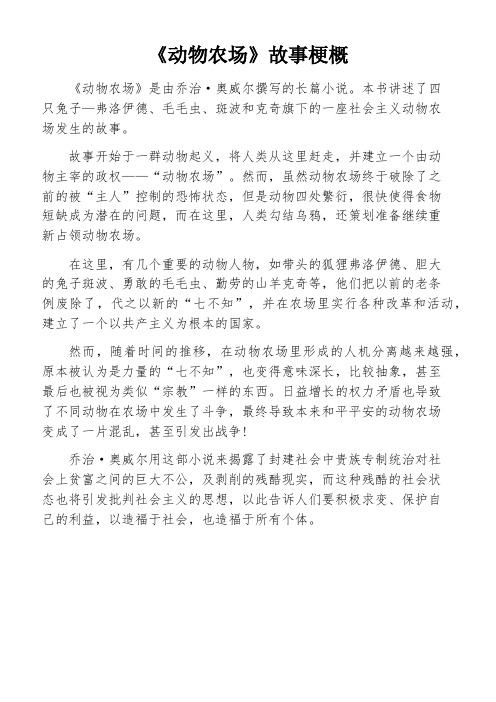
《动物农场》故事梗概
《动物农场》是由乔治·奥威尔撰写的长篇小说。
本书讲述了四
只兔子—弗洛伊德、毛毛虫、斑波和克奇旗下的一座社会主义动物农
场发生的故事。
故事开始于一群动物起义,将人类从这里赶走,并建立一个由动
物主宰的政权——“动物农场”。
然而,虽然动物农场终于破除了之
前的被“主人”控制的恐怖状态,但是动物四处繁衍,很快使得食物
短缺成为潜在的问题,而在这里,人类勾结乌鸦,还策划准备继续重
新占领动物农场。
在这里,有几个重要的动物人物,如带头的狐狸弗洛伊德、胆大
的兔子斑波、勇敢的毛毛虫、勤劳的山羊克奇等,他们把以前的老条
例废除了,代之以新的“七不知”,并在农场里实行各种改革和活动,建立了一个以共产主义为根本的国家。
然而,随着时间的推移,在动物农场里形成的人机分离越来越强,原本被认为是力量的“七不知”,也变得意味深长,比较抽象,甚至
最后也被视为类似“宗教”一样的东西。
日益增长的权力矛盾也导致
了不同动物在农场中发生了斗争,最终导致本来和平平安的动物农场
变成了一片混乱,甚至引发出战争!
乔治·奥威尔用这部小说来揭露了封建社会中贵族专制统治对社
会上贫富之间的巨大不公,及剥削的残酷现实,而这种残酷的社会状
态也将引发批判社会主义的思想,以此告诉人们要积极求变、保护自
己的利益,以造福于社会,也造福于所有个体。
animal farm主要内容

animal farm主要内容
《动物庄园》是乔治·奥威尔的一部寓言小说,通过对农庄动物起义和建立自己社会的描写,暗示了人类社会的政治现实。
这个故事以一个农庄为背景,揭示了权力和腐败的本质,以及人性的弱点。
农庄动物们决定起义,推翻了人类的统治。
他们建立了一个理想的社会,每个动物都平等地参与决策和劳动,按需分配资源。
最初,动物们热情高涨,充满了希望和憧憬。
然而,很快一些动物开始崛起,夺取了更多的权力。
最有权势的是猪,他们利用智慧和言辞的娴熟,逐渐掌控了庄园的一切。
他们制定了一套自己的法律和规则,以维护自己的特权。
随着时间的推移,庄园的情况开始变得糟糕。
动物们的生活并没有变得更好,反而变得更糟。
猪们剥夺了其他动物的权益,用虚假的宣传和恐吓来控制他们。
他们篡改了历史,通过宣传来符合自己的利益。
动物们开始感到困惑和绝望。
最终,动物们发现,他们自己所建立的社会并没有摆脱人类社会的弊端。
猪们变得和人类一样,甚至更糟。
他们背叛了最初的理想,成为了压迫者和剥削者。
这个故事向读者们展示了权力的腐败和人性的弱点。
它警示我们,即使是最美好的愿望和最理想的社会,也会被权力的诱惑腐败。
《动物庄园》以其生动的描写和独特的寓言形式,给人们带来了深刻的
启示。
通过这个故事,我们可以思考现实社会中的政治和社会问题。
我们应该保持警惕,不被权力的诱惑所蒙蔽。
我们应该坚守自己的理想和原则,不让权力腐败玷污我们的心灵。
只有通过团结和努力,我们才能创造一个真正公正和平等的社会。
《动物农场》故事梗概
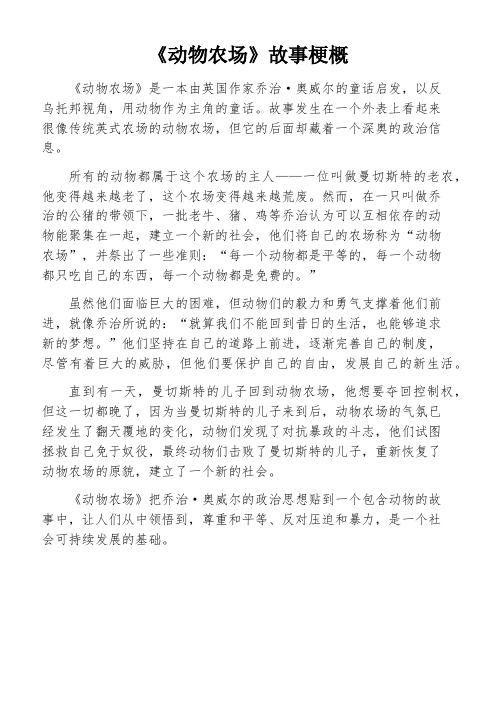
《动物农场》故事梗概
《动物农场》是一本由英国作家乔治·奥威尔的童话启发,以反
乌托邦视角,用动物作为主角的童话。
故事发生在一个外表上看起来
很像传统英式农场的动物农场,但它的后面却藏着一个深奥的政治信息。
所有的动物都属于这个农场的主人——一位叫做曼切斯特的老农,他变得越来越老了,这个农场变得越来越荒废。
然而,在一只叫做乔
治的公猪的带领下,一批老牛、猪、鸡等乔治认为可以互相依存的动
物能聚集在一起,建立一个新的社会,他们将自己的农场称为“动物
农场”,并祭出了一些准则:“每一个动物都是平等的,每一个动物
都只吃自己的东西,每一个动物都是免费的。
”
虽然他们面临巨大的困难,但动物们的毅力和勇气支撑着他们前进,就像乔治所说的:“就算我们不能回到昔日的生活,也能够追求
新的梦想。
”他们坚持在自己的道路上前进,逐渐完善自己的制度,
尽管有着巨大的威胁,但他们要保护自己的自由,发展自己的新生活。
直到有一天,曼切斯特的儿子回到动物农场,他想要夺回控制权,但这一切都晚了,因为当曼切斯特的儿子来到后,动物农场的气氛已
经发生了翻天覆地的变化,动物们发现了对抗暴政的斗志,他们试图
拯救自己免于奴役,最终动物们击败了曼切斯特的儿子,重新恢复了
动物农场的原貌,建立了一个新的社会。
《动物农场》把乔治·奥威尔的政治思想贴到一个包含动物的故
事中,让人们从中领悟到,尊重和平等、反对压迫和暴力,是一个社
会可持续发展的基础。
《动物农场》故事梗概
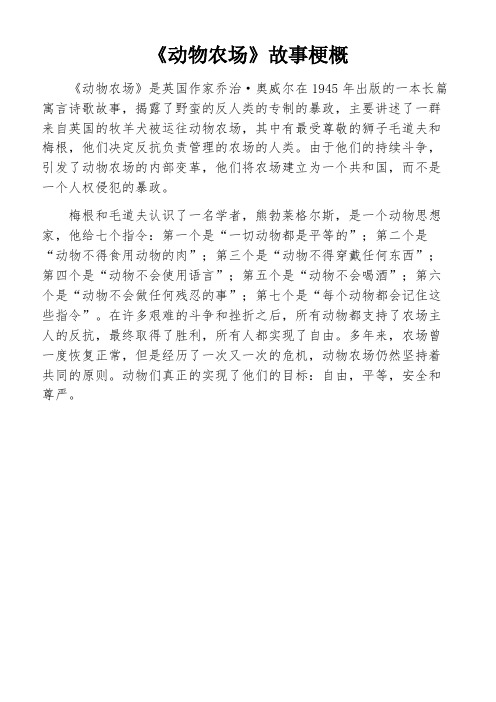
《动物农场》故事梗概
《动物农场》是英国作家乔治·奥威尔在1945年出版的一本长篇寓言诗歌故事,揭露了野蛮的反人类的专制的暴政,主要讲述了一群来自英国的牧羊犬被运往动物农场,其中有最受尊敬的狮子毛道夫和梅根,他们决定反抗负责管理的农场的人类。
由于他们的持续斗争,引发了动物农场的内部变革,他们将农场建立为一个共和国,而不是一个人权侵犯的暴政。
梅根和毛道夫认识了一名学者,熊勃莱格尔斯,是一个动物思想家,他给七个指令:第一个是“一切动物都是平等的”;第二个是“动物不得食用动物的肉”;第三个是“动物不得穿戴任何东西”;第四个是“动物不会使用语言”;第五个是“动物不会喝酒”;第六个是“动物不会做任何残忍的事”;第七个是“每个动物都会记住这些指令”。
在许多艰难的斗争和挫折之后,所有动物都支持了农场主人的反抗,最终取得了胜利,所有人都实现了自由。
多年来,农场曾一度恢复正常,但是经历了一次又一次的危机,动物农场仍然坚持着共同的原则。
动物们真正的实现了他们的目标:自由,平等,安全和尊严。
动物庄园内容概括
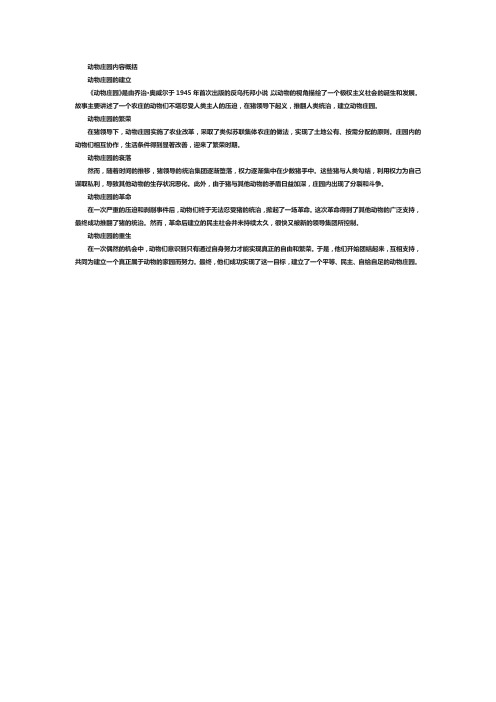
动物庄园内容概括
动物庄园的建立
《动物庄园》是由乔治·奥威尔于1945年首次出版的反乌托邦小说,以动物的视角描绘了一个极权主义社会的诞生和发展。
故事主要讲述了一个农庄的动物们不堪忍受人类主人的压迫,在猪领导下起义,推翻人类统治,建立动物庄园。
动物庄园的繁荣
在猪领导下,动物庄园实施了农业改革,采取了类似苏联集体农庄的做法,实现了土地公有、按需分配的原则。
庄园内的动物们相互协作,生活条件得到显著改善,迎来了繁荣时期。
动物庄园的衰落
然而,随着时间的推移,猪领导的统治集团逐渐堕落,权力逐渐集中在少数猪手中。
这些猪与人类勾结,利用权力为自己谋取私利,导致其他动物的生存状况恶化。
此外,由于猪与其他动物的矛盾日益加深,庄园内出现了分裂和斗争。
动物庄园的革命
在一次严重的压迫和剥削事件后,动物们终于无法忍受猪的统治,掀起了一场革命。
这次革命得到了其他动物的广泛支持,最终成功推翻了猪的统治。
然而,革命后建立的民主社会并未持续太久,很快又被新的领导集团所控制。
动物庄园的重生
在一次偶然的机会中,动物们意识到只有通过自身努力才能实现真正的自由和繁荣。
于是,他们开始团结起来,互相支持,共同为建立一个真正属于动物的家园而努力。
最终,他们成功实现了这一目标,建立了一个平等、民主、自给自足的动物庄园。
奥威尔《动物农场》的故事梗概
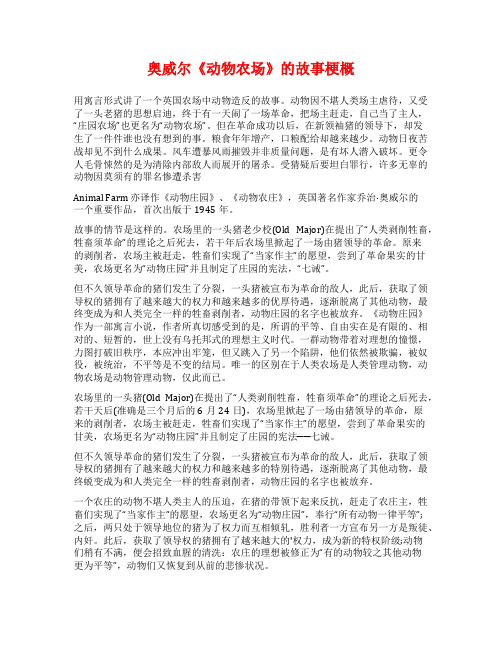
奥威尔《动物农场》的故事梗概用寓言形式讲了一个英国农场中动物造反的故事。
动物因不堪人类场主虐待,又受了一头老猪的思想启迪,终于有一天闹了一场革命,把场主赶走,自己当了主人,“庄园农场”也更名为“动物农场”。
但在革命成功以后,在新领袖猪的领导下,却发生了一件件谁也没有想到的事。
粮食年年增产,口粮配给却越来越少。
动物日夜苦战却见不到什么成果。
风车遭暴风雨摧毁并非质量问题,是有坏人潜入破坏。
更令人毛骨悚然的是为清除内部敌人而展开的屠杀。
受猜疑后要坦白罪行,许多无辜的动物因莫须有的罪名惨遭杀害Animal Farm 亦译作《动物庄园》、《动物农庄》,英国著名作家乔治·奥威尔的一个重要作品,首次出版于1945年。
故事的情节是这样的。
农场里的一头猪老少校(Old Major)在提出了“人类剥削牲畜,牲畜须革命”的理论之后死去,若干年后农场里掀起了一场由猪领导的革命。
原来的剥削者,农场主被赶走,牲畜们实现了“当家作主”的愿望,尝到了革命果实的甘美,农场更名为“动物庄园”并且制定了庄园的宪法,“七诫”。
但不久领导革命的猪们发生了分裂,一头猪被宣布为革命的敌人,此后,获取了领导权的猪拥有了越来越大的权力和越来越多的优厚待遇,逐渐脱离了其他动物,最终变成为和人类完全一样的牲畜剥削者,动物庄园的名字也被放弃。
《动物庄园》作为一部寓言小说,作者所真切感受到的是,所谓的平等、自由实在是有限的、相对的、短暂的,世上没有乌托邦式的理想主义时代。
一群动物带着对理想的憧憬,力图打破旧秩序,本应冲出牢笼,但又跳入了另一个陷阱,他们依然被欺骗,被奴役,被统治,不平等是不变的结局。
唯一的区别在于人类农场是人类管理动物,动物农场是动物管理动物,仅此而已。
农场里的一头猪(Old Major)在提出了“人类剥削牲畜,牲畜须革命”的理论之后死去,若干天后(准确是三个月后的6月24日),农场里掀起了一场由猪领导的革命,原来的剥削者,农场主被赶走,牲畜们实现了“当家作主”的愿望,尝到了革命果实的甘美,农场更名为“动物庄园”并且制定了庄园的宪法──七诫。
animal farm主要内容
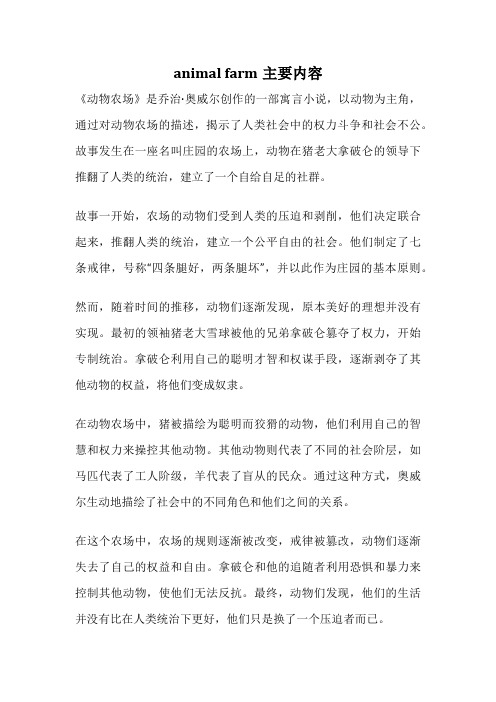
animal farm主要内容《动物农场》是乔治·奥威尔创作的一部寓言小说,以动物为主角,通过对动物农场的描述,揭示了人类社会中的权力斗争和社会不公。
故事发生在一座名叫庄园的农场上,动物在猪老大拿破仑的领导下推翻了人类的统治,建立了一个自给自足的社群。
故事一开始,农场的动物们受到人类的压迫和剥削,他们决定联合起来,推翻人类的统治,建立一个公平自由的社会。
他们制定了七条戒律,号称“四条腿好,两条腿坏”,并以此作为庄园的基本原则。
然而,随着时间的推移,动物们逐渐发现,原本美好的理想并没有实现。
最初的领袖猪老大雪球被他的兄弟拿破仑篡夺了权力,开始专制统治。
拿破仑利用自己的聪明才智和权谋手段,逐渐剥夺了其他动物的权益,将他们变成奴隶。
在动物农场中,猪被描绘为聪明而狡猾的动物,他们利用自己的智慧和权力来操控其他动物。
其他动物则代表了不同的社会阶层,如马匹代表了工人阶级,羊代表了盲从的民众。
通过这种方式,奥威尔生动地描绘了社会中的不同角色和他们之间的关系。
在这个农场中,农场的规则逐渐被改变,戒律被篡改,动物们逐渐失去了自己的权益和自由。
拿破仑和他的追随者利用恐惧和暴力来控制其他动物,使他们无法反抗。
最终,动物们发现,他们的生活并没有比在人类统治下更好,他们只是换了一个压迫者而已。
通过《动物农场》,奥威尔揭示了权力的腐败和社会的不公,警示人们要警惕权力的滥用。
这个故事告诉我们,为了实现真正的平等和自由,我们不能仅仅依靠一个人或者一个团体的领导,而是需要每个人的参与和关注。
《动物农场》以其深刻的寓意和生动的描写,引起了读者的共鸣。
它不仅是一部反映现实社会问题的文学作品,更是一部引人思考的哲学著作。
通过动物的视角,奥威尔向我们展示了权力的腐败和社会的不公,引发了读者对社会现象的思考和反思。
总的来说,《动物农场》是一部富有情感和深意的作品,通过对动物农场的描写,揭示了人类社会中的权力斗争和社会不公。
它提醒我们警惕权力的滥用,并呼吁每个人为实现真正的平等和自由而努力。
《动物农场》故事梗概
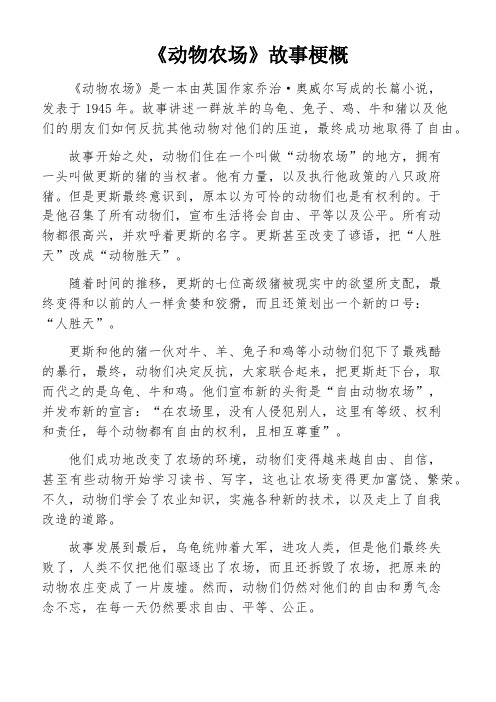
《动物农场》故事梗概《动物农场》是一本由英国作家乔治·奥威尔写成的长篇小说,发表于1945年。
故事讲述一群放羊的乌龟、兔子、鸡、牛和猪以及他们的朋友们如何反抗其他动物对他们的压迫,最终成功地取得了自由。
故事开始之处,动物们住在一个叫做“动物农场”的地方,拥有一头叫做更斯的猪的当权者。
他有力量,以及执行他政策的八只政府猪。
但是更斯最终意识到,原本以为可怜的动物们也是有权利的。
于是他召集了所有动物们,宣布生活将会自由、平等以及公平。
所有动物都很高兴,并欢呼着更斯的名字。
更斯甚至改变了谚语,把“人胜天”改成“动物胜天”。
随着时间的推移,更斯的七位高级猪被现实中的欲望所支配,最终变得和以前的人一样贪婪和狡猾,而且还策划出一个新的口号:“人胜天”。
更斯和他的猪一伙对牛、羊、兔子和鸡等小动物们犯下了最残酷的暴行,最终,动物们决定反抗,大家联合起来,把更斯赶下台,取而代之的是乌龟、牛和鸡。
他们宣布新的头衔是“自由动物农场”,并发布新的宣言:“在农场里,没有人侵犯别人,这里有等级、权利和责任,每个动物都有自由的权利,且相互尊重”。
他们成功地改变了农场的环境,动物们变得越来越自由、自信,甚至有些动物开始学习读书、写字,这也让农场变得更加富饶、繁荣。
不久,动物们学会了农业知识,实施各种新的技术,以及走上了自我改造的道路。
故事发展到最后,乌龟统帅着大军,进攻人类,但是他们最终失败了,人类不仅把他们驱逐出了农场,而且还拆毁了农场,把原来的动物农庄变成了一片废墟。
然而,动物们仍然对他们的自由和勇气念念不忘,在每一天仍然要求自由、平等、公正。
动物庄园故事概括
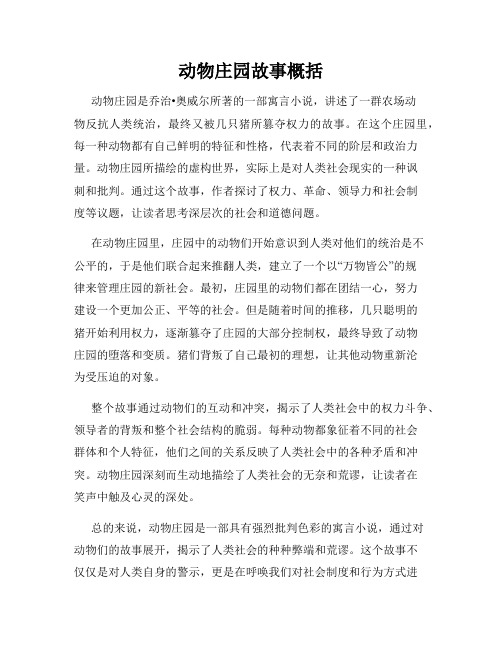
动物庄园故事概括动物庄园是乔治•奥威尔所著的一部寓言小说,讲述了一群农场动物反抗人类统治,最终又被几只猪所篡夺权力的故事。
在这个庄园里,每一种动物都有自己鲜明的特征和性格,代表着不同的阶层和政治力量。
动物庄园所描绘的虚构世界,实际上是对人类社会现实的一种讽刺和批判。
通过这个故事,作者探讨了权力、革命、领导力和社会制度等议题,让读者思考深层次的社会和道德问题。
在动物庄园里,庄园中的动物们开始意识到人类对他们的统治是不公平的,于是他们联合起来推翻人类,建立了一个以“万物皆公”的规律来管理庄园的新社会。
最初,庄园里的动物们都在团结一心,努力建设一个更加公正、平等的社会。
但是随着时间的推移,几只聪明的猪开始利用权力,逐渐篡夺了庄园的大部分控制权,最终导致了动物庄园的堕落和变质。
猪们背叛了自己最初的理想,让其他动物重新沦为受压迫的对象。
整个故事通过动物们的互动和冲突,揭示了人类社会中的权力斗争、领导者的背叛和整个社会结构的脆弱。
每种动物都象征着不同的社会群体和个人特征,他们之间的关系反映了人类社会中的各种矛盾和冲突。
动物庄园深刻而生动地描绘了人类社会的无奈和荒谬,让读者在笑声中触及心灵的深处。
总的来说,动物庄园是一部具有强烈批判色彩的寓言小说,通过对动物们的故事展开,揭示了人类社会的种种弊端和荒谬。
这个故事不仅仅是对人类自身的警示,更是在呼唤我们对社会制度和行为方式进行反思和改变。
只有在理解和认识到自己的错误之后,人类社会才有可能迎来真正的和谐与进步。
愿动物庄园里的故事能够一直在我们记忆中升起警示之光,引领我们不断前行。
《动物庄园》内容概括
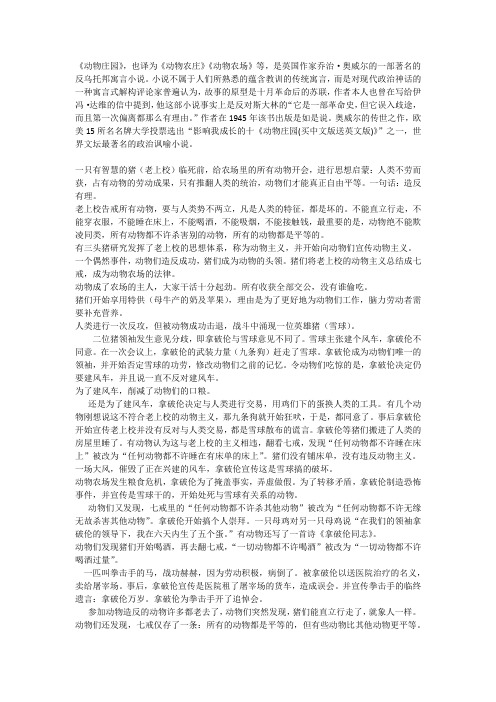
《动物庄园》,也译为《动物农庄》《动物农场》等,是英国作家乔治·奥威尔的一部著名的反乌托邦寓言小说。
小说不属于人们所熟悉的蕴含教训的传统寓言,而是对现代政治神话的一种寓言式解构评论家普遍认为,故事的原型是十月革命后的苏联,作者本人也曾在写给伊冯·达维的信中提到,他这部小说事实上是反对斯大林的“它是一部革命史,但它误入歧途,而且第一次偏离都那么有理由。
”作者在1945年该书出版是如是说。
奥威尔的传世之作,欧美15所名名牌大学投票选出“影响我成长的十《动物庄园(买中文版送英文版)》”之一,世界文坛最著名的政治讽喻小说。
一只有智慧的猪(老上校)临死前,给农场里的所有动物开会,进行思想启蒙:人类不劳而获,占有动物的劳动成果,只有推翻人类的统治,动物们才能真正自由平等。
一句话:造反有理。
老上校告戒所有动物,要与人类势不两立,凡是人类的特征,都是坏的。
不能直立行走,不能穿衣服,不能睡在床上,不能喝酒,不能吸烟,不能接触钱,最重要的是,动物绝不能欺凌同类,所有动物都不许杀害别的动物,所有的动物都是平等的。
有三头猪研究发挥了老上校的思想体系,称为动物主义,并开始向动物们宣传动物主义。
一个偶然事件,动物们造反成功,猪们成为动物的头领。
猪们将老上校的动物主义总结成七戒,成为动物农场的法律。
动物成了农场的主人,大家干活十分起劲。
所有收获全部交公,没有谁偷吃。
猪们开始享用特供(母牛产的奶及苹果),理由是为了更好地为动物们工作,脑力劳动者需要补充营养。
人类进行一次反攻,但被动物成功击退,战斗中涌现一位英雄猪(雪球)。
二位猪领袖发生意见分歧,即拿破伦与雪球意见不同了。
雪球主张建个风车,拿破伦不同意。
在一次会议上,拿破伦的武装力量(九条狗)赶走了雪球。
拿破伦成为动物们唯一的领袖,并开始否定雪球的功劳,修改动物们之前的记忆。
令动物们吃惊的是,拿破伦决定仍要建风车,并且说一直不反对建风车。
为了建风车,削减了动物们的口粮。
- 1、下载文档前请自行甄别文档内容的完整性,平台不提供额外的编辑、内容补充、找答案等附加服务。
- 2、"仅部分预览"的文档,不可在线预览部分如存在完整性等问题,可反馈申请退款(可完整预览的文档不适用该条件!)。
- 3、如文档侵犯您的权益,请联系客服反馈,我们会尽快为您处理(人工客服工作时间:9:00-18:30)。
The Author➢Born in India in1903, in his words "lower-upper-middle class".His father worked in the Opium Department of the Indian Civil Service.➢Childhood in England, attend Eton College➢ 5 years in Burma (1922-1927): joined Indian Imperial Police, learned about oppression and control➢Went back to London, started his writing careerIn imitation of Jack London, Orwell started to explore the poorer parts of London➢In the spring of 1928 he moved to Paris, living in poverty 【he recorded his experiences of the low life for use in "The Spike", his first published essay in English, and in the second half of his first book, Down and Out in Paris and London《巴黎伦敦落魄记》】➢Orwell fought in the Spanish Civil War. His experiences there gave rise to Homage to Catalonia (1938) 《向加泰罗尼亚致敬》➢On the outbreak of World War II, Orwell submitted his name to the Central Register for war effort but nothing transpired. In August 1941, Orwell finally obtained "war work" when he was taken on full-time by the BBC's Eastern Service. He supervised cultural broadcasts to India.The CharactersMr. Jones - The often drunk farmer who owns the Manor Farm. Mr. Jones is an unkind master who indulges himself while his animals lack food; he thus represents Tsar Nicholas II, whom the Russian Revolution ousted.Mr. Frederick - The tough, shrewd operator of Pinchfield, a neighboring farm. Based on Adolf Hitler, the ruler of Nazi Germany in the 1930s and 1940s, Mr. Frederick proves an untrustworthy neighbor.Mr. Pilkington - The easygoing gentleman farmer who runs Foxwood, a neighboring farm. Mr. Frederick’s bitter enemy, Mr. Pilkington represents the capitalist governments of England and the United States.Mr. Whymper - The human solicitor whom Napoleon hires to represent Animal Farm in human society. Mr. Whym per’s entry into the Animal Farm community initiates contact between Animal Farm and human society, alarming the common animals.Old Major - The prize-winning boar, whose vision of a socialist utopia serves as the inspiration for the Rebellion. Orwell based Major on both the German political economist Karl Marx and the Russian revolutionary leader Lenin.Napoleon - The pig who emerges as the leader of Animal Farm after the Rebellion. Based on Joseph Stalin, Napoleon uses military force (his nine loyal attack dogs) to intimidate the other animals and consolidate his power. In his supreme craftiness, Napoleon proves more treacherous than his counterpart, Snowball. Snowball - The pig who challenges Napoleon for control of Animal Farm after the Rebellion. Based on Leon Trotsky,(列昂·托洛茨基,俄国与世界历史上最重要的无产阶级革命家之一,二十世纪国际共产主义运动的左翼领袖,领导十月革命) Snowball is intelligent, passionate, eloquent(雄辩的), and less subtle and devious than his counterpart, Napoleon. Snowball seems to win the loyalty of the other animals and cement his power.Squealer - The pig who spreads Napoleon’s propaganda among the other animals. Squealer justifies the pigs’ monopolization of resources and spreads false statistics pointing to the farm’s success. Orwell uses Squealer to explore the ways in which those in power often use rhetoric and language to twist the truth and gain and maintain social and political control.Boxer- The cart-horse whose incredible strength, dedication(奉献), and loyalty play a key role in the early prosperity of Animal Farm and the later completion of the windmill. Quick to help but rather slow-witted, Boxer shows much devotion to Animal Farm’s ideals but little ability to think about them independently. He naïvely trusts the pigs to make all his decisions for him. His two mottoes a re “I will work harder” and “Napoleon is always right.”Read an in-depth analysis of Boxer.Clover - A good-hearted female cart-horse and Boxer’s close friend. Clover often suspects the pigs of violating one or another of the Seven Commandments, but she repeatedly blames herself for misremembering the commandments.Moses- The tame raven who spreads stories of Sugarcandy Mountain, the paradise to which animals supposedly go when they die. Moses plays only a small role in Animal Farm, but Orwell uses him to explore how communism exploits religion as something with which to pacify the oppressed.Mollie -The vain, flighty(轻浮) mare who pulls Mr. Jones’s carriage. Mollie craves the attention of human beings and loves being groomed(打扮)and pampered(娇惯). She has a difficult time with her new life on Animal Farm, as she misses wearing ribbons in her mane and eating sugar cubes. She represents the petit bourgeoisie that fled from Russia a few years after the Russian Revolution.Benjamin - The long-lived donkey who refuses to feel inspired by the Rebellion. Benjamin firmly believes that life will remain unpleasant no matter who is in charge. Of all of the animals on the farm, he alone comprehends the changes that take place, but he seems either unwilling or unable to oppose the pigs. Muriel - The white goat who reads the Seven Commandments to Clover whenever Clover suspects the pigs of violating their prohibitions.Jessie and Bluebell- Two dogs, each of whom gives birth early in the novel. Napoleon takes the pupp ies in order to “educate” them.Minimus- The poet pig who writes verse about Napoleon and pens the banal patriotic song “Animal Farm, Animal Farm” to replace the earlier idealistic hymn “Beasts of England,” which Old Major passes on to the others.Plot1.Old Major, a prize-winning boar, gathers the animals of the Manor Farm for a meeting in the big barn.He tells them of a dream he has had in which all animals live together with no human beings to oppress or control them. He tells the animals that they must work toward such a paradise and teaches them a song called “Beasts of England,” in which his dream vision is lyrically described. The animals greet Major’s vision with great enthusiasm. But he dies only three nights after the meeting,2.three younger pigs—Snowball, Napoleon, and Squealer—formulate his main principles into aphilosophy called Animalism. Late one night, the animals manage to defeat the farmer Mr. Jones in a battle, running him off the land. They rename the property Animal Farm. And they all agreed that the farmhouse preserved as a museum and no animal must ever live there. At first, Animal Farm prospers because productivity rises out of great enthusiasm. Everyone obeys the rules. Snowball works at teaching the animals to read, and Napoleon takes a group of young puppies to educate them in the principles of Animalism.3.When Mr. Jones reappears to take back his farm, the animals defeat him again, in what comes to beknown as the Battle of the Cowshed, and take the farmer’s abandoned gun as a to ken of their victory.As time passes, however, Napoleon and Snowball increasingly quibble over the future of the farm, and they begin to struggle with each other for power and influence among the other animals.4.Snowball concocts a scheme to build an electricity-generating windmill, but Napoleon solidly opposesthe plan. At the meeting to vote on whether to take up the project, Snowball gives a passionate speech.Although Napoleon gives only a brief retort, he then makes a strange noise, and nine attack dogs—the puppies that Napoleon had confiscated in order to “educate”—burst into the barn and chase Snowball from the farm. Napoleon assumes leadership of Animal Farm and declares that there will be no more meetings. From that point on, he asserts, the pigs alone will make all of the decisions—for the good of every animal.5.Napoleon now quickly changes his mind about the windmill, and the animals, especially Boxer, devotetheir efforts to completing it. One day, after a storm, the animals find the windmill toppled. The human farmers in the area declare smugly that the animals made the walls too thin, but Napoleon claims that Snowball returned to the farm to sabotage the windmill. He stages a great purge, during which various animals who have allegedly participate d in Snowball’s great conspiracy—meaning any animal who opposes Napoleon’s uncontested leadership—meet instant death at the teeth of the attack dogs. With his leadership unquestioned (Boxer has taken up a second maxim, “Napoleon is always right”),6.Napoleon begins expand ing his powers,rewriting history to make Snowball a villain. Napoleon alsobegins to act more and more like a human being—sleeping in a bed, drinking whisky, and engaging in trade with neighboring farmers. The original Animalist principles strictly forbade such activities, but Squealer, Napoleon’s propagandist, justifies every action to the other animals, convincing them that Napoleon is a great leader and is making things better for everyone—despite the fact that the common animals are cold, hungry, and overworked.7.Mr. Frederick, a neighboring farmer, cheats Napoleon in the purchase of some timber and then attacksthe farm and dynamites (blows up) the windmill, which had been rebuilt at great expense. After the demolition of the windmill, a pitched battle ensues, during which Boxer receives major wounds. The animals rout the farmers, but Boxer’s injuries weaken him. When he later falls while working on the windmill, he senses that his time has nearly come. One day, Boxer is nowhere to be found. According to Squealer, Boxer has died in peace after having been taken to the hospital, praising the Rebellion with his last breath. In actuality, Napoleon has sold his most loyal and long-suffering worker to a glue maker in order to get money for whisky.8.Years pass on Animal Farm, and the pigs become more and more like human beings—walking upright,carrying whips, and wearing clothes. Eventually, the seven principles of Animalism, known as the Seven Commandments and inscribed on the side of the barn, be come reduced to a single principle reading “all animals are equal, but some animals are more equal than others.” Napoleon entertains a human farmer named Mr. Pilkington at a dinner and declares his intent to ally himself with the human farmers against the laboring classes of both the human and animal communities. He also changes the name of Animal Farm back to the Manor Farm, claiming that this title is the “correct” one. Looking in at the party of elites through the farmhouse window, the common animals can no longer tell which are the pigs and which are the human beings.ThemesThe Corruption of Socialist Ideals in the Soviet UnionAnimal Farm is most famous in the West as a stinging critique of the history and rhetoric of the Russian Revolution. Retelling the story of the emergence and development of Soviet communism in the form of an animal fable, Animal Farm allegorizes the rise to power of the dictator Joseph Stalin. In the novella, the overthrow of the human oppressor Mr. Jones by a democratic coalition of animals quickly gives way to the consolidation of power among the pigs. Much like the Soviet intelligentsia, the pigs establish themselves as the ruling class in the new society.The struggle for preeminence between Leon Trotsky and Stalin emerges in the rivalry between the pigs Snowball and Napoleon. In both the historical and fictional cases, the idealistic but politically less powerful figure (Trotsky and Snowball) is expelled from the revolutionary state by the malicious and violent usurper of power (Stalin and Napoleon). The purges and show trials with which Stalin eliminated his enemies and solidified his political base find expression in Animal Farm as the false confessions and executions of animals whom Napoleon distrusts following the collapse of the windmill. Stalin’s tyrannical rule and eventual abandonment of the founding principles of the Russian Revolution are represented by the pigs’ turn to violent government and the adoption of human traits and behaviors, the trappings of their original oppressors.Although Orwell believed strongly in socialist ideals, he felt that the Soviet Union realized these ideals in a terribly perverse form. His novella creates its most powerful ironies in the moments in which Orwell depicts the corruption of Animalist ideals by those in power. For Animal Farm serves not so much to condemn tyranny or despotism as to indict the horrifying hypocrisy of tyrannies that base themselves on, and owe their initial power to, ideologies of liberation and equality. The gradual disintegration and perversion of the Seven Commandments illustrates this hypocrisy with vivid force, as do Squealer’s elaborate philosophical justifications for the pigs’ blatantly unprincipled actions. Thus, the novella critiques the violence of the Sta linist regime against the human beings it ruled, and also points to Soviet communism’s violence against human logic, language, and ideals.The Societal Tendency toward Class StratificationAnimal Farm offers commentary on the development of class tyranny and the human tendency to maintain and reestablish class structures even in societies that allegedly stand for total equality. The novella illustrates how classes that are initially unified in the face of a common enemy, as the animals are against the humans, may become internally divided when that enemy is eliminated. The expulsion of Mr. Jones creates a power vacuum, and it is only so long before the next oppressor assumes totalitarian control. The natural division between intellectual and physical labor quickly comes to express itself as a new set of class divisions, with the “brainworkers” (as the pigs claim to be) using their superior intelligence to manipulate society to their own benefit. Orwell never clarifies in Animal Farm whether this negative state of affairs constitutes an inherent aspect of society or merely an outcome contingent on the integrity of a society’s intelligentsia. In either case, the novella points to the force of this tendency toward class stratification in many communities and the threat that it poses to democracy and freedom.The Danger of a Naïve Working ClassOne of the novella’s most impressive accomplishments is its portrayal not just of the figures in power but also of the oppressed people themselves. Animal Farm is not told from the perspective of any particularcharacter, though occasionally it does slip into Clover’s consciousness. Rather, the story is told from the perspective of the common animals as a whole. Gullible, loyal, and hardworking, these animals give Orwell a chance to sketch how situations of oppression arise not only from the motives and tactics of the oppressors but also from the naïveté of the oppressed, who are not necessarily in a position to be better educated or informed. When presented with a dilemma, Boxer prefers not to puzzle out the implications of various possible actions but instead to repeat to himself, “Napoleon is always right.” Animal Farm demonstrates how the inability or unwillingness to question authority condemns the working class to suffer the full extent of the ruling class’s oppression.The Abuse of Language as Instrumental to the Abuse of PowerOne of Orwell’s central concerns, both in Animal Farm and in 1984, is the way in which language can be manipulated as an instrument of control. In Animal Farm, the pigs gradually twist and distort a rhetoric of socialist revolution to justify their behavior and to keep the other animals in the dark. The animals heartily embrace Major’s visionary ideal of socialism, but after Major dies, the pi gs gradually twist the meaning of his words. As a result, the other animals seem unable to oppose the pigs without also opposing the ideals of the Rebellion. By the end of the novella, after Squealer’s repeated reconfigurations of the Seven Commandments in order to decriminalize the pigs’ treacheries, the main principle of the farm can be openly stated as “all animals are equal, but some animals are more equal than others.” This outrageous abuse of the word “equal” and of the ideal of equality in general typifies the pigs’ method, which becomes increasingly audacious as the novel progresses. Orwell’s sophisticated exposure of this abuse of language remains one of the most compelling and enduring features of Animal Farm, worthy of close study even after we have decoded its allegorical characters and events.一、判断题(每题1分,共25分)1、创业板上市公司主要是处于种子期、初创期的中小企业。
